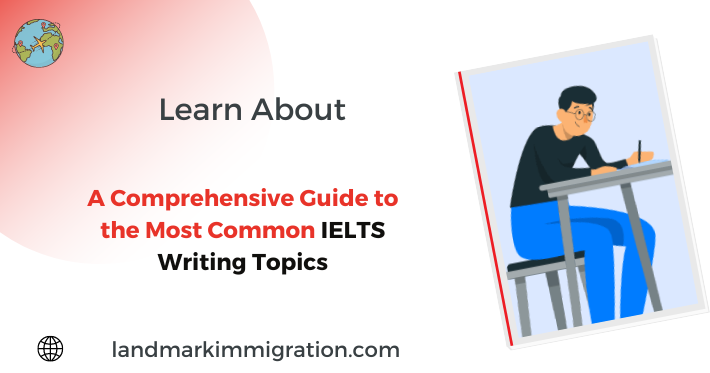
24 February 2024
The IELTS (International English Language Testing System) Writing test is a crucial component of the IELTS exam, assessing candidates’ ability to communicate effectively in written English. To excel in the Writing section, it is essential to understand and be prepared for the most common topics that appear in the test. This guide aims to provide a detailed overview of these recurring themes, along with strategies to tackle them effectively.
Understanding the IELTS Writing Task
The IELTS Writing test consists of two tasks:
- Task 1
Academic candidates are required to describe visual information (graphs, charts, diagrams), while General Training candidates may need to write a letter.
- Task 2
Both Academic and General Training candidates must write an essay in response to a given prompt.
Most Common Task 1 Topics
Line Graphs:
Trends over time, such as population growth, unemployment rates, or changes in consumption habits.
Bar Charts:
Comparisons of data between different categories, like sales figures for various products or demographic information.
Pie Charts:
Showing proportions or percentages, often related to the distribution of resources or budget allocation.
Tables:
Presenting structured data, including statistical information like scores, results of surveys, or comparisons of data.
Process Diagrams:
Illustrating steps in a process, such as manufacturing or natural phenomena like the water cycle.
Strategies for Task 1
- Analyze the visual information carefully, identifying key trends, patterns, and outliers.
- Organize your response logically, with an introduction, overview, and detailed paragraphs describing significant points.
- Use a range of vocabulary and appropriate grammar structures to accurately describe the data.
- Aim for a balanced overview that highlights the main trends without going into excessive detail.
- Practice writing Task 1 responses under timed conditions to improve speed and accuracy.
Most Common Task 2 Topics:
Education:
Discussing issues related to schooling, such as the effectiveness of educational systems, the role of technology in education, or the importance of lifelong learning.
Environment:
Exploring environmental problems like pollution, climate change, conservation efforts, or sustainable development.
Society:
Addressing social issues such as crime, poverty, inequality, family structure, or cultural traditions.
Health:
Examining topics like public health initiatives, healthcare systems, mental health awareness, or lifestyle choices.
Globalisation:
Debating the impact of globalization on economies, cultures, communication, or employment patterns.
Strategies for Task 2:
- Carefully analyze the prompt, identifying the main topic, instruction keywords, and any specific questions to address.
- Plan your essay structure, including an introduction with a clear thesis statement, body paragraphs discussing key points, and a conclusion summarizing your arguments.
- Support your ideas with relevant examples, statistics, or personal experiences to strengthen your arguments.
- Consider different perspectives on the topic and acknowledge counterarguments where appropriate.
- Pay attention to coherence and cohesion, using cohesive devices and logical transitions between sentences and paragraphs.
General Tips for IELTS Writing:
- Practice regularly under timed conditions to improve your writing speed and accuracy.
- Expand your vocabulary and grammar knowledge to express ideas more effectively.
- Seek feedback from teachers, tutors, or peers to identify areas for improvement in your writing.
- Familiarize yourself with the assessment criteria for IELTS Writing and strive to meet each criterion effectively.
- Review and analyze sample essays to understand the structure, style, and language features of high-scoring responses.
FAQs
Is writing task difficult in IELTS?
Getting ready for the IELTS writing test may pose challenges, yet with effective strategies and assistance, you can conquer even the most daunting IELTS writing topics. Through consistent practice, skill refinement, and leveraging feedback and guidance, you can enhance your prospects of attaining a commendable score on the examination.
Has the syllabus changed for IELTS 2024?
The syllabus for IELTS 2024 has not changed.
How can I practice the IELTS writing task?
- Be consistent with your practice
- Keep looking for opportunities that help you enhance your vocabulary.
- Make sure to analyze and review essays available online. Keep track of the format and style of essays that score high.
- Understand the details of how IELTS writing tests are assessed.
- Always be on the lookout for critical reviews and feedback on your practice answers.
- Trust experts and enrol yourself in reputed IELTS training services. They have the right expertise and experience to help you get the right guidance. This will eventually help you ace your test.
Are essay questions repeated in IELTS?
There are some set of topics that get repeated. Based on that, the questions keep changing every year.
Conclusion:
Preparing for the IELTS Writing test requires a solid understanding of the most common topics and effective strategies for approaching each task. By familiarizing yourself with these recurring themes and practising writing responses, you can enhance your confidence and performance on test day. Remember to stay calm, manage your time effectively, and focus on communicating your ideas clearly and coherently to achieve success in the IELTS Writing test. For more queries and concerns, contact experts at Landmark Immigration.




